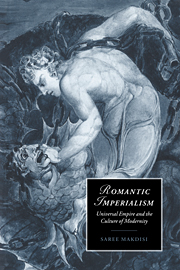Book contents
- Frontmatter
- Contents
- Preface and acknowledgments
- 1 Introduction: Universal Empire
- 2 Home imperial: Wordsworth's London and the spot of time
- 3 Wordsworth and the image of Nature
- 4 Waverley and the cultural politics of dispossession
- 5 Domesticating exoticism: transformations of Britain's Orient, 1785–1835
- 6 Beyond the realm of dreams: Byron, Shelley, and the East
- 7 William Blake and the Universal Empire
- 8 Conclusions
- Notes
- Bibliography
- Index
- CAMBRIDGE STUDIES IN ROMANTICISM
7 - William Blake and the Universal Empire
Published online by Cambridge University Press: 29 September 2009
- Frontmatter
- Contents
- Preface and acknowledgments
- 1 Introduction: Universal Empire
- 2 Home imperial: Wordsworth's London and the spot of time
- 3 Wordsworth and the image of Nature
- 4 Waverley and the cultural politics of dispossession
- 5 Domesticating exoticism: transformations of Britain's Orient, 1785–1835
- 6 Beyond the realm of dreams: Byron, Shelley, and the East
- 7 William Blake and the Universal Empire
- 8 Conclusions
- Notes
- Bibliography
- Index
- CAMBRIDGE STUDIES IN ROMANTICISM
Summary
They are mockd, by every one that passes by. they regard not
They labour; & when their Wheels are broken by scorn & malice
They mend them sorrowing with many tears & afflictions
William Blake, JerusalemI wander thro' each charter'd street,
Near where the charter'd Thames does flow
And mark in every face I meet
Marks of weakness, marks of woe.
In every cry of every Man,
In every Infants cry of fear,
In every voice; in every ban,
The mind-forg'd manacles I hear
How the Chimney-sweepers cry
Every blackning Church appalls,
And the hapless Soldiers sigh
Runs in blood down Palace walls
But most thro' midnight streets I hear
How the youthful Harlots curse
Blasts the new-born Infants tear
And blights with plagues the Marriage hearse
In the sixteen lines of his 1794 Song of Experience, London, Blake produces a nightmarish vision of London – both as a city and as a space of systemic modern oppression. It is precisely because Blake identifies London with more than its material and physical spatiality (its buildings, streets, etc.) that, in charting a space of systemic oppression, he is also able to chart the space of London as a material city with physical and tangible dimensions. The poem recognizes that London cannot be apprehended except in such figurative or symbolic terms.
- Type
- Chapter
- Information
- Romantic ImperialismUniversal Empire and the Culture of Modernity, pp. 154 - 172Publisher: Cambridge University PressPrint publication year: 1998

